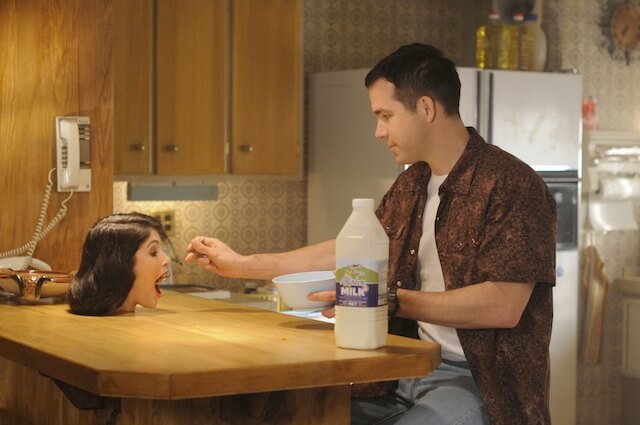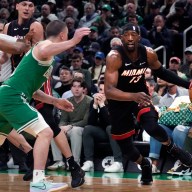‘The Voices’ The quality that most stands out in “The Voices” is not its pitch black humor but its sweetness — this, a film about a troubled serial killer, Jerry (Ryan Reynolds), who cuts up bodies and stores heads in fridges. Jerry is disturbed in ways we can’t fathom but the way “The Voices” observes and portrays him, we understand where he’s coming from. He’s a genuinely nice guy whose issues can come off to others, including the coworkers he winds up dispatching, as simply weird. They have no idea when he goes home he talks to his dog and cat, who talk back a la “Babe” (in voices by Reynolds). When he kills it is truly (the first time, anyway) by accident, with much sad-eyed apologizing on Jerry’s part, and when he hacks them into crimson mush we don’t get glory shots of the gore. It’s just not that kind of midnight movie. First up on Jerry’s chopping block is Fiona (Gemma Arterton), an antsy English transplant who has captured Jerry’s purely puppy dog affections. His awkwardness is such that it almost entirely dwarfs the good looks of 2011’s Sexiest Man Alive. Repulsed, she stands him up, but when he ends up stabbing her, it really is by accident. When he finishes the job it really seems like it’s the only option he could think of. “The Voices” isn’t the first dark comedy about murderers, and it’s certainly not the most original. Its familiarity — and a shruggy ending, in which the film finally writes itself into a wall from which it can’t back up — do help obscure the singular things it does just right. It gets in his head, sometimes literally; rather than a drab Midwestern anytown, he works in a bright factory with pink uniforms. His home is more muted, but every now and then the facade drops, revealing a dank lair teeming with stray blood stains and rotting heads that Jerry envisions talking to him. The funny parts of “The Voices” aren’t the kills. In fact, these scenes can be scary, as women who thought they could trust Jerry wind up helpless, frightened as mortality looms. It’s an anguish made all the more intense by the way Jerry keeps trying to apologize to them, assuring he doesn’t mean it even as he’s doing it. Most of the film is a quasi-subjective portrayal of its main character’s headspace, but the scene where he turns on a coworker (Anna Kendrick) with a crush on him — her trying to hide or evade him as he tries to capture her while apologizing for same — gives you brief glimpses of what it’s like on the outside, to become one of his prey. “The Voices” isn’t an overtly political or feminist film; it is, after all, an empathetic portrayal of a man who kills women. But it is tempting to read deep into what the film is saying, if at all, given who made it. It is, after all, the improbable latest film directed by Marjane Satrapi, the graphic novel memoirist of “Persepolis,” who continued to chronicle Iran’s cultural richness (and current longstanding miseries) in “Chicken with Plums.” She didn’t write “The Voices,” and her direction only superficially betrays her history drawing comic book frames. (The widescreen framing is basically just precise, but she — wisely — doesn’t overdo it when portraying Jerry’s heightened view of his apartment.) But her mere presence — and her history of railing against sexist regimes — underlines what appears to be a subtextual critique of male power that’s harmful even when ostensibly well-meaning. Is this reading too much into it? Perhaps. “The Voices” is almost consistently a bright colored, sarcastic and pitch-black comedy that gets a lot of its yuks from a surly cat with a Scottish accent. But there’s a sadness to it — a melancholy in the way its characters try to eke on in discouraging surroundings that offer little life and fun. (Kendrick nails the kind of person who doesn’t know how much better life gets in the outside world.) And there’s a deep melancholy in Reynolds’ performance, which is at once precisely exaggerated — if a few rungs shy of his hyperactive eyebrow work in “Van Wilder” and “Just Friends” — and deeply sincere. He bulges his doe-eyes, yes, but he also carries himself with the air of someone who regrets his every movement — a slight hunched-over quality that so begs for pity that he has it, even when he’s hacking up abdomens. You feel for the guy, but the film stops well short of apologizing for him. That would be monstrous.
Director: Marjane Satrapi
Stars: Ryan Reynolds, Anna Kendrick
Rating: R
3 (out of 5) Globes
Review: ‘The Voices’ turns Ryan Reynolds into a sweet murderer

Lionsgate
Follow Matt Prigge on Twitter@mattprigge


















